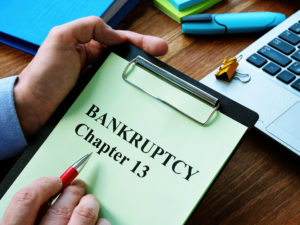Reasons to Choose a Reorganization over a Liquidation/Discharge
 There are two primary approaches to personal bankruptcy—the permanent discharge of certain debts under Chapter 7 in exchange for the transfer of unprotected assets to the bankruptcy court; or the reorganization/restructuring of personal debt in Chapter 13. With a Chapter 7, your debts go away for good—you’ll no longer have any legal obligation to pay them. With a Chapter 13 petition, you simply enter into new payment arrangements, which typically last three to five years. It may beg the question—if you can get rid of your debts forever, why wouldn’t you do so?
There are two primary approaches to personal bankruptcy—the permanent discharge of certain debts under Chapter 7 in exchange for the transfer of unprotected assets to the bankruptcy court; or the reorganization/restructuring of personal debt in Chapter 13. With a Chapter 7, your debts go away for good—you’ll no longer have any legal obligation to pay them. With a Chapter 13 petition, you simply enter into new payment arrangements, which typically last three to five years. It may beg the question—if you can get rid of your debts forever, why wouldn’t you do so?
You May Not Qualify to File under Chapter 7
Under the current American bankruptcy laws, you must demonstrate eligibility for protection under Chapter 7 by submitting to a “means test.” That test requires that you demonstrate to the court that you lack the resources to repay your creditors over a three-to-five-year period. If the results indicate that you have the financial capability to satisfy your creditors, either from savings or earnings, you will likely be limited to filing under Chapter 13.
Chapter 13 Allows You to Cure an Arrearage
With a Chapter 7 filing, you may have to surrender some assets to the bankruptcy court. However, there are exemptions under State and Federal Laws that we can opt to use for your case, but they don’t always cover everything. Although in the vast majority of cases, your home and vehicle(s) and your personal property will be protected, including, but not limited to, retirement accounts, jewelry, clothing, household goods and electronics.
Where Chapter 7 will not help is in the curing of the arrearages on your home or vehicles. If you are facing a foreclosure/repossession or cannot get a modification, Chapter 7 only delays the foreclosure. It does not give you an avenue to create a payment plan to cure what you are behind.
With a Chapter 13 filing, there’s no requirement to transfer any of your property so if you have a non-exempt asset you can keep it under a Chapter 13 (if you have a sufficient plan). You can also stop foreclosure or repossession proceedings for the entire period of the Chapter 13 (typically 3-5 years), with a plan to cure past-due payments and get caught up.
You May Be Able to More Effectively Manage Arrearages that Cannot Be Discharged
Certain types of debts, such as child support or tax delinquencies, may be difficult or impossible to discharge in Chapter 7. You may, however, reorganize those arrearages to make catching up on them more attainable.
Contact an Experienced Rockwall, TX Bankruptcy Attorney
At the Law Offices of Carrie Weir, all potential clients are entitled to a free initial consultation. To arrange an appointment, contact my office online or call 972-772-3083. I handle Texas personal bankruptcy filings in Kaufman County, Rockwall County, Collin County, Dallas County, Hunt County and the surrounding counties.







